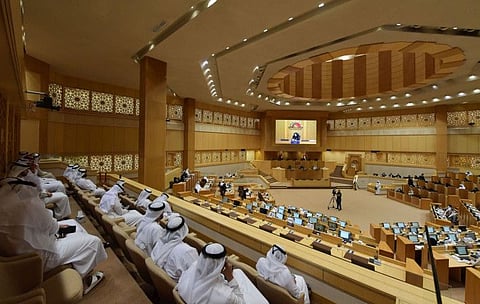FNC has evolved into a robust parliamentary mechanism
The inclusiveness demonstrates UAE’s emphasis on democratic conventions

The 17th legislative session of the Federal National Council was inaugurated last week by His Highness Sheikh Mohammed Bin Rashid Al Maktoum, Vice-President and Prime Minister of the UAE and Ruler of Dubai, marking the beginning of another robust phase for UAE’s progress
As a pivotal instrument of legislative scrutiny and guidance that shapes the UAE’s development, the FNC has been performing a stellar job since its inception in 1971, particularly in its decision to move onwards from its foundation stage — when its members were appointed by the Rulers of the seven emirates — to its inclusive stage, in 2006, when elected representatives of the seven emirates became a part of the council’s membership. This inclusiveness, a demonstration of UAE’s emphasis on democratic conventions, has enabled the FNC to evolve into the finest parliamentary mechanism that binds the citizens and the Rulers in a shared vision of progress and welfare for their country.
The same sense of pride and passion for national excellence marks the council’s working style, which has a frank and uncompromising approach to policies and their impact on progress. Members of the council exercise a complete freedom of speech that includes the right to critique draft laws by the Cabinet and throughout its history, the council has exerted a far-reaching and progressive influence on the federal government.
The UAE has arrived at another milestone in its journey towards enabling women become equal partners in the country’s progress, a national value that has earned it international recognition.Gulf News
This year’s council strength is especially significant for its member representation: 50 per cent, or 20 of the 40 FNC members are women, in keeping with the decision of the President His Highness Sheikh Khalifa Bin Zayed Al Nahyan. In 2018, the President directed the authorities concerned to double women’s representation in the FNC from its then 22.5 per cent ratio.
In the 2011 FNC elections, women accounted for 46 per cent of the total number of voters. In the 2015 elections, they accounted for 48 per cent of the total of 224,281 voters and in this year’s election, women accounted for 50.62 per cent of the total number of voters. In achieving this, the UAE has arrived at another milestone in its journey towards enabling women become equal partners in the country’s progress, a national value that has earned it international recognition.
This reiterates what has always been the hallmark of UAE’s approach to nation-building: for its people, and with the help of its people.



